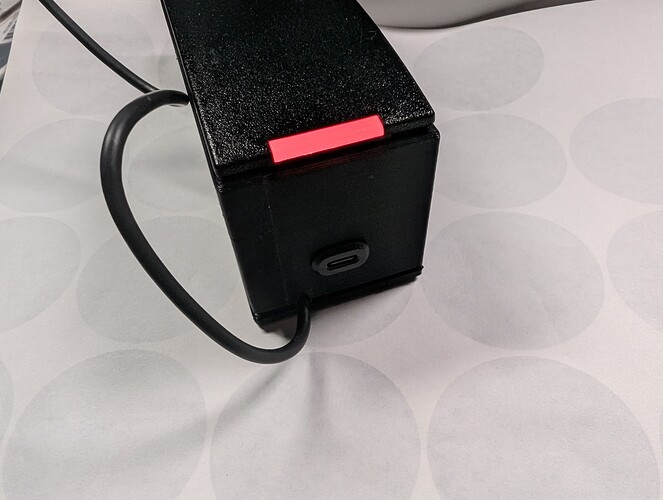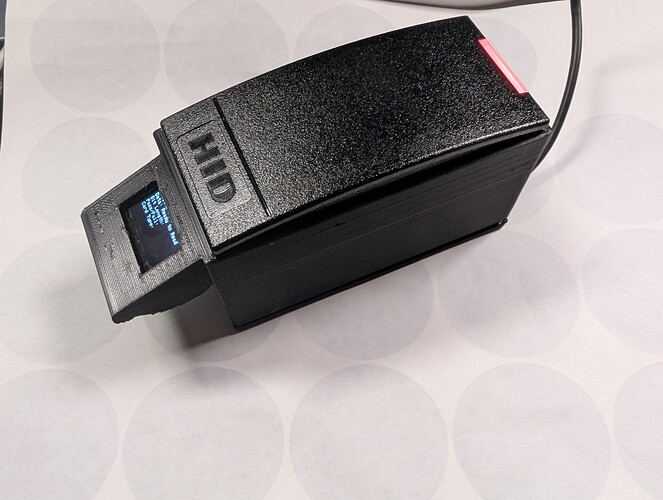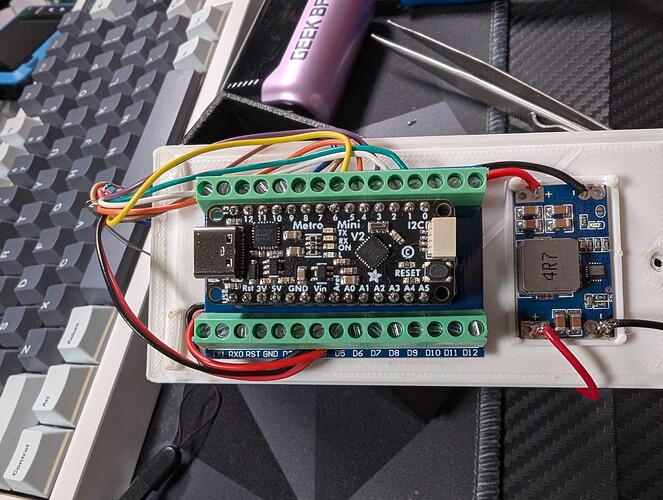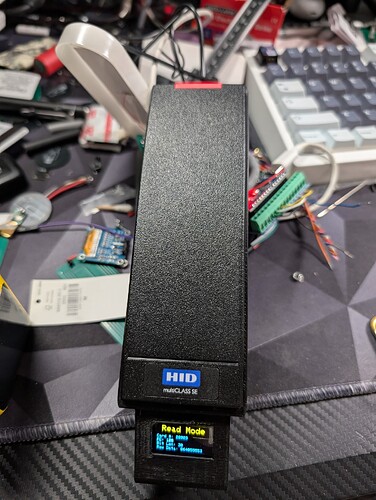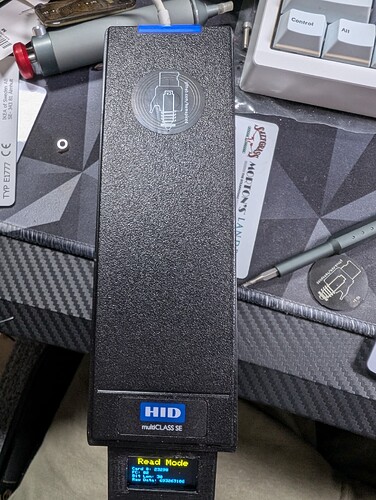This should be a straight copy/paste in the first post.
I see this all the time in Deviant Ollams videos and i wanted to try my hand at making it.
Parts
Case - HID R10 and RP15 Case with Arduino, Oled, and Voltage Stepdown by Hamspiced - Thingiverse
HID R10 Multi-class reader - Find these on Ebay for around 20-50$ used
Arduino Nano - $16.49 per 3 or $5.49 ea
USB-C Pigtail - $7.99 per 10 or $0.80 ea
Arduino Breakout Board - $8.79 per 3 or $2.93 ea
5v Buck Converter - $11.59 per 5 or $2.32 ea
i2c 2 Color OLED - $13.98 per 5 or $2.80 ea
Secure R10 to top of case with screw and nut
Secure arduino to breakout board and breakout board to bottom case. Secure Stepdown module to bottom case
Connect USB-C Power to Stepdown input, then jumper stepdown output to Arduino at USB in and Ground.
Wire up i2c screen on 5v of arduino and ground as well as the rest of the I2c Pins.
Wire HID R10/R15 to arduino. Secure with screws.
I want to change the code to more reflect how @DeviantOllam does his. With different modes of use (theres a card read mode, and then an access controller mode that makes it function like a door reader. However i want to actually make it a door reader with a mag striker and relay), however i am not THAT great at arduino code. if anyone is please reach out id love to bounce my ideas off of you. I wish his code was opensourced but i dont think he wants to release that IP.
I wanted to get this out to everyone because it really is a cool project and it didnt take too long to spin up. You can turn it wireless by adding a ESPKey to it and then just use a powerbank to power it off of the port.
If there is interest i will do a full write-up and pinout.
R15 to Stepdown Module To Arduino Pinout
HID Reader to Arduino Uno
Black => Gnd
Green => D2
White => D3
Brown => D5
Orange => D6
Yellow => A3
OLED to Arduino
VCC => 5v
GND => Ground
SCL => A5
SDA => A4
POWER IN TO STEPDOWN
BLACK => - IN
RED => + IN
STEPDOWN to Arduino
- out => GND
+ out => VIN
Current Arduino Code
#include <Wire.h>
#include <Adafruit_GFX.h>
#include <Adafruit_SSD1306.h>
#include <Wiegand.h>
#include <EEPROM.h>
#define SCREEN_WIDTH 128
#define SCREEN_HEIGHT 64
#define OLED_RESET -1
#define SCREEN_ADDRESS 0x3C
#define WIEGAND_D0_PIN 2 // Green wire (Data 0)
#define WIEGAND_D1_PIN 3 // White wire (Data 1)
#define BEEPER_PIN A3
#define SIGNAL_PIN 7 // Door strike signal pin
#define MAX_CARDS 20
#define EEPROM_CARD_COUNT_ADDR 0
#define EEPROM_CARD_DATA_ADDR 4
#define CARD_SIZE sizeof(unsigned long)
Adafruit_SSD1306 display(SCREEN_WIDTH, SCREEN_HEIGHT, &Wire, OLED_RESET);
WIEGAND wg;
bool cardDisplayed = false;
unsigned long lastCardData = 0;
uint8_t lastBitLength = 0;
uint8_t lastFacilityCode = 0;
uint16_t lastCardNumber = 0;
#define MODE_READ 1
#define MODE_DOOR 2
#define MODE_ADD 3
#define MODE_REMOVE 4
uint8_t currentMode = MODE_READ;
const unsigned long configCards[4] = {
0x1E6DC032, // Read mode
0x1E6D9861, // Door mode
0x1E6DFCA0, // Add mode
0x1E6DE636 // Remove mode
};
unsigned long authorizedCards[MAX_CARDS];
uint8_t cardCount = 0;
uint8_t countBits(uint32_t data) {
uint8_t count = 0;
while (data) {
data >>= 1;
count++;
}
return count;
}
void loadAuthorizedCards() {
cardCount = EEPROM.read(EEPROM_CARD_COUNT_ADDR);
if (cardCount > MAX_CARDS) {
cardCount = 0;
return;
}
for (uint8_t i = 0; i < cardCount; i++) {
unsigned long cardData = 0;
for (uint8_t j = 0; j < CARD_SIZE; j++) {
cardData |= (unsigned long)EEPROM.read(EEPROM_CARD_DATA_ADDR + i * CARD_SIZE + j) << (8 * j);
}
authorizedCards[i] = cardData;
}
}
void saveAuthorizedCards() {
EEPROM.update(EEPROM_CARD_COUNT_ADDR, cardCount);
for (uint8_t i = 0; i < cardCount; i++) {
unsigned long cardData = authorizedCards[i];
for (uint8_t j = 0; j < CARD_SIZE; j++) {
EEPROM.update(EEPROM_CARD_DATA_ADDR + i * CARD_SIZE + j, (cardData >> (8 * j)) & 0xFF);
}
}
}
bool isAuthorized(unsigned long cardData) {
for (uint8_t i = 0; i < cardCount; i++) {
if (authorizedCards[i] == cardData) {
return true;
}
}
return false;
}
void addCard(unsigned long cardData) {
if (cardCount < MAX_CARDS && !isAuthorized(cardData)) {
authorizedCards[cardCount] = cardData;
cardCount++;
saveAuthorizedCards();
}
}
void removeCard(unsigned long cardData) {
for (uint8_t i = 0; i < cardCount; i++) {
if (authorizedCards[i] == cardData) {
for (uint8_t j = i; j < cardCount - 1; j++) {
authorizedCards[j] = authorizedCards[j + 1];
}
cardCount--;
saveAuthorizedCards();
break;
}
}
}
void displayScanPrompt() {
display.clearDisplay();
display.setTextSize(2);
display.setCursor(12, 0);
switch (currentMode) {
case MODE_READ: display.println("READ MODE"); break;
case MODE_DOOR: display.println("DOOR MODE"); break;
case MODE_ADD: display.println("ADD MODE"); break;
case MODE_REMOVE: display.println("DEL MODE"); break;
}
display.setTextSize(1);
display.setCursor(25, 25);
display.println("Scan a card...");
display.display();
cardDisplayed = false;
}
void displayCardData(unsigned long cardData, uint8_t bitLength, uint8_t facilityCode, uint16_t cardNumber, const char* message = "") {
display.clearDisplay();
display.setTextSize(2);
display.setCursor(12, 0);
switch (currentMode) {
case MODE_READ: display.println("READ MODE"); break;
case MODE_DOOR: display.println("DOOR MODE"); break;
case MODE_ADD: display.println("ADD MODE"); break;
case MODE_REMOVE: display.println("DEL MODE"); break;
}
display.setTextSize(1);
if (currentMode == MODE_READ) {
display.setCursor(0, 20);
display.print("Hex: 0x");
display.println(cardData, HEX);
display.setCursor(0, 30);
display.print("Raw: ");
display.println(cardData);
display.setCursor(0, 40);
display.print("Bits: ");
display.print(bitLength);
display.println(" (approx)");
display.setCursor(0, 50);
display.print("FC: ");
display.print(facilityCode);
display.print(" ID: ");
display.println(cardNumber);
} else {
display.setCursor(30, 20); // Center message
display.println(message);
}
display.display();
cardDisplayed = true;
}
void setup() {
if (!display.begin(SSD1306_SWITCHCAPVCC, SCREEN_ADDRESS)) {
while (1);
}
display.clearDisplay();
display.setTextColor(SSD1306_WHITE);
display.setTextSize(2);
display.setCursor(25, 16);
display.println("RFIDsim");
display.setTextSize(1);
display.setCursor(31, 40);
display.println("v1.0 By Hamspiced and Peekaboo");
display.display();
delay(1000);
loadAuthorizedCards();
displayScanPrompt();
wg.begin(WIEGAND_D0_PIN, WIEGAND_D1_PIN);
pinMode(BEEPER_PIN, OUTPUT);
digitalWrite(BEEPER_PIN, HIGH);
pinMode(SIGNAL_PIN, OUTPUT);
digitalWrite(SIGNAL_PIN, LOW);
}
void loop() {
if (wg.available()) {
unsigned long cardData = wg.getCode();
// Check for configuration card
for (uint8_t i = 0; i < 4; i++) {
if (cardData == configCards[i]) {
currentMode = i + 1;
displayScanPrompt();
digitalWrite(BEEPER_PIN, LOW);
delay(100);
digitalWrite(BEEPER_PIN, HIGH);
return;
}
}
// Process card data
uint8_t bitLength = countBits(cardData);
uint8_t facilityCode = (cardData >> 16) & 0xFF;
uint16_t cardNumber = cardData & 0xFFFF;
digitalWrite(BEEPER_PIN, LOW);
delay(50);
digitalWrite(BEEPER_PIN, HIGH);
lastCardData = cardData;
lastBitLength = bitLength;
lastFacilityCode = facilityCode;
lastCardNumber = cardNumber;
// Handle mode-specific actions
switch (currentMode) {
case MODE_READ:
displayCardData(cardData, bitLength, facilityCode, cardNumber);
break;
case MODE_DOOR:
if (isAuthorized(cardData)) {
digitalWrite(SIGNAL_PIN, HIGH);
displayCardData(cardData, bitLength, facilityCode, cardNumber, "Authorized");
delay(5000); // Show for 5 seconds
digitalWrite(SIGNAL_PIN, LOW);
displayScanPrompt();
} else {
displayCardData(cardData, bitLength, facilityCode, cardNumber, "Access Denied");
delay(5000); // Show for 5 seconds
displayScanPrompt();
}
break;
case MODE_ADD:
addCard(cardData);
displayCardData(cardData, bitLength, facilityCode, cardNumber, "Card Added");
break;
case MODE_REMOVE:
removeCard(cardData);
displayCardData(cardData, bitLength, facilityCode, cardNumber, "Card Removed");
break;
}
} else if (cardDisplayed) {
displayCardData(lastCardData, lastBitLength, lastFacilityCode, lastCardNumber);
} else {
displayScanPrompt();
}
}
